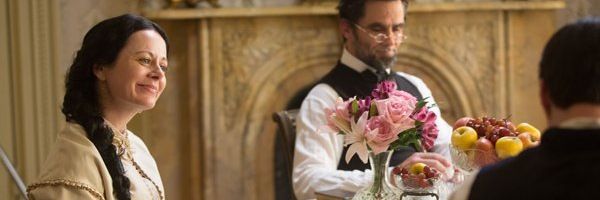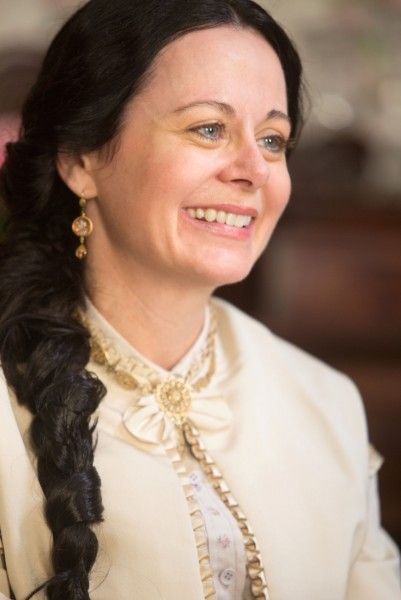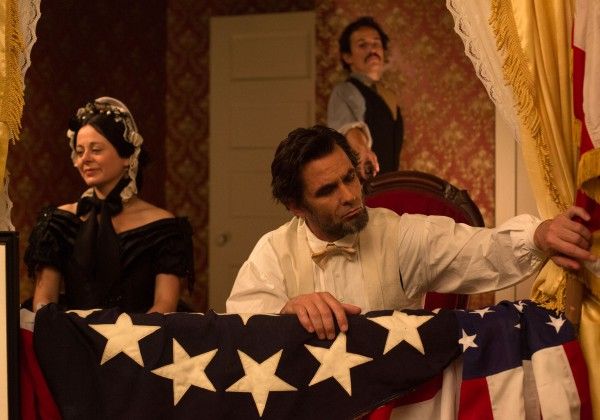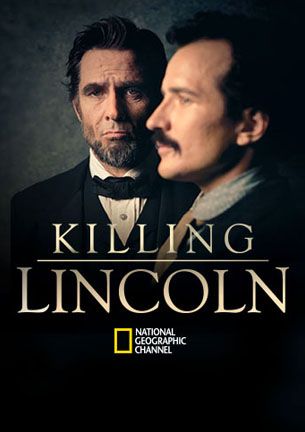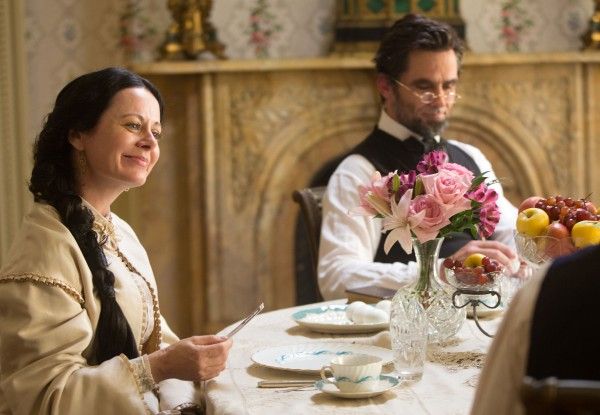The National Geographic original scripted drama Killing Lincoln, adapted from Bill O’Reilly’s best-selling book and narrated by Academy Award winner Tom Hanks, chronicles the final days of President Lincoln (Billy Campbell) and the plot devised by one of the most notorious and complex villains of all time, John Wilkes Booth (Jesse Johnson). Booth viewed Lincoln as a tyrant eager to eradicate the Southern way of life, and took matters into his own hands, which resulted in a murder that shocked the nation. Executive produced by Tony and Ridley Scott, the film also stars Geraldine Hughes, Graham Beckel and Shawn Pyfrom.
During this recent exclusive interview with Collider, actress Geraldine Hughes, who plays Mary Todd Lincoln, talked about how she came to be a part of this film, what she did to recover from the emotional exhaustion once she was done with the role, how she viewed Mary Todd Lincoln, what it was like to wear these costumes, and how surreal it was to relive such a historical moment. She also talked about how she originally became an actor, what she looks for in a project, and the experience of doing her one-woman show, Belfast Blues. Check out what she had to say after the jump.
Collider: Is it exciting to know that anyone who’s seen Lincoln and who wants to know more about the actual assassination, now has somewhere to go, to learn more about that?
GERALDINE HUGHES: It’s just the most perfect situation. I hadn’t seen Lincoln until recently. I went to see it and, at the end of it, I thought, “Brilliant! We’re perfectly set up! It’s fantastic!” Our film goes inside the assassination. I was shaking after I saw it. It’s very, very, very emotional and an incredible accomplishments, on everyone’s part, from the costumers to the D.P. to the director. We shot it in 15 days. It’s really extraordinary. And as an Irish person playing Mary Todd Lincoln, I was like, “I can’t believe it!” I’m just so grateful that that always will exist.
When this opportunity presented itself, was that part of the attraction, or did that make you want to run for the hills?
HUGHES: I wanted to run for the hills! And then, when I read it, I realized that there’s not a lot for her to do until he gets shot. Once he gets shot, she’s the heartbeat of that. It was very exhausting and scary to be wailing and crying for three days straight, but I realized that was very important. It was also important to have that femininity in there, as well, because it’s such a male piece because of the time period. I’m really pleased with what they accomplished. The actual assassination scene takes place in this tiny little set, and they did it in two takes with 12 actors. It was like a company of actors. The actors had all of these complicated lines to say and I was like, “We’re going to be here forever! It’s two in the morning and I’m exhausted. I can’t cry anymore!” And then, it started and they did one take with two cameras. Then, they did a second take and were done. I was like, “You’ve got to be kidding me! They can’t have gotten in!” But, they got everything. It’s so gorgeous!
When you do something so emotionally exhausting, what did you want to do to recover, once it was all done?
HUGHES: Room service and a comedy on TV. It was hard. It’s not easy because there are so many elements to battle on set. It was such a beautiful set, but you’ve got the grips and the crew. I just had to put music on and really focus. I had to use everything I could to do it. But, I just wanted to have a drink and leave it behind. I really want to do a comedy soon.
How did you view Mary Todd Lincoln, during this time period?
HUGHES: I guess she’d be called bipolar in today’s world. She just felt things so deeply, and she had so much loss in her life. She had lost her baby already, and then she lost another kid after him. And she was put in an asylum by her other son, when she really just needed a shrink and a pill and she would have been fine. It was such a tragic thing. It should have been such a joyful time. It was such an important time in American history.
Even though everyone knows that Lincoln was married to Mary Todd, did researching her for this role make you feel like you really knew nothing about her, before doing this?
HUGHES: Yes, absolutely! That’s how I approach most things, anyway. I don’t know anything. Also, there was so much about how this was written and what I had to do that was very much in the moment and very much about loss. I had the books and the letters, and there’s a great play called The Last Days of Mrs. Lincoln, that no one really knows about. And then, I just put on the dress and was on the set.
What I had to do was so visceral. It’s a limited amount of time on screen, but an intense time. I’m still reading books on her because she’s so interesting. I love how everyone knows who she is, and she’s known as the crazy lady. She was not very well-liked, at all, especially with the over-spending. Decorating the White House was so over budget, but she was very proud and had been brought up in a certain way and wanted to present the place in a certain way. She was who she was, and she never apologized for that. But, I think she was an extraordinary woman. I feel very sorry for her. I hope that the little bit that I do in this film will be revelatory. Although, I love Sally Field in Lincoln. I just think that she’s amazing. The fact that I got to do something in the same year as her, it doesn’t get any better than that. I love her!
What was it like to wear these costumes? Did it easily get you into the right mind-set?
HUGHES: They were extraordinary. I can’t believe what they did on their budget. The detail of my costumes, in particular, was extraordinary. The black dress that I spend most of my time in, in the film, was built in a day. It was designed and built by this seamstress, and they sewed individual little embroideries on it. And then, the corset and the hoops were very restrictive, and it was very hot in Richmond. Now I know why they had vapors in those days. It was very constricting.
Is it really surreal to relive such a major historical moment?
HUGHES: Well, I think it was surreal for me because I’m so grateful to be in America and to be an American citizen. I remember the day I got my American citizenship. I was just feeling very grateful, to be honest. It was very special, and it was very scary to play someone of such stature. A lot of people are going to watch this because they’re going to want to compare it [to Lincoln], but there’s no comparison. They’re completely different films, which I’m so delighted about. I don’t do anything, but show up and do what I do.
What initially made you want to be an actor? Was it something you just always wanted to do?
HUGHES: My mother will tell you that I came out of the womb like Bette Davis. I suppose it was always in my blood. And then, at a certain point, I just didn’t have any other option, really. It was just what I did and what I loved to do, and what I still love to do. I really do love it. I’ve had a very strange and interesting career, so far. How did I end up in Rocky Balboa? I worked with Clint Eastwood and tried to put him in an old person’s home in Gran Torino. And then, I played Mary Todd Lincoln. I’m a Northern Irish girl. I don’t know how that happened, but it did. So, god knows what I’m going to do next.
When you’re looking for your next project, what do you look for?
HUGHES: The fact that someone asks me! To me, everything is interesting. I just did Cyrano de Bergerac on Broadway, and that was interesting. And I did a horror film, and that was interesting. Everything is an adventure. If you ask me to do something, I’ll probably say yes because I think everything can be extraordinary, if you work on it. You have to find an angle on something. Even if you’re in something terrible, you have to make what you do memorable.
What made you decide to do your one-woman show, Belfast Blues?
HUGHES: That was terrifying! It wasn’t my idea. I never would have come up with that, but I had written some stories and this woman said, “This is amazing! It would be a brilliant play.” And I was like, “No, I’m not doing that!” But, it ended up being the reason why everything else happened. So, you never know. I worked very hard on that. Try forgetting your lines when you’re the only one on stage, and you have no idea what comes next. But, the wonderful thing about that is that you’re the only one on stage. They wouldn’t know, if I skipped five pages. I’ve been on stage before when I’ve lost my line and the other actor has not helped me. That was a long silence. That feeling still haunts me.
But, I was doing Belfast Blues for so long that I got really sick. I came out on stage one day and I couldn’t speak. I literally lost my voice. The place was packed and my body literally said, “You have to stop.” So, I had to stop for about a week. They wanted to shoot me with steroids and things they give horses, but I said, “No, I think I just need to rest for a week,” and then I went back. I did eight shows a week for about four months. That was insane, but it was important for me to do it.
When I first did the play, I started it in a 35-seat theater in Los Angeles, called The Black Dahlia Theatre. It was a little shoe shop. My mom had come from Ireland, and it was the night I was showing my mom this play, which was my life story and I was playing her, and Sally Field came to the show. At the end of it, someone stood up and I thought, “Oh, that’s my mom!,” but it was Sally Field. I’ve always wanted to thank her for that. I thanked her afterwards, but it was one of those moments that was extraordinary.
Killing Lincoln airs on National Geographic on February 17th.

